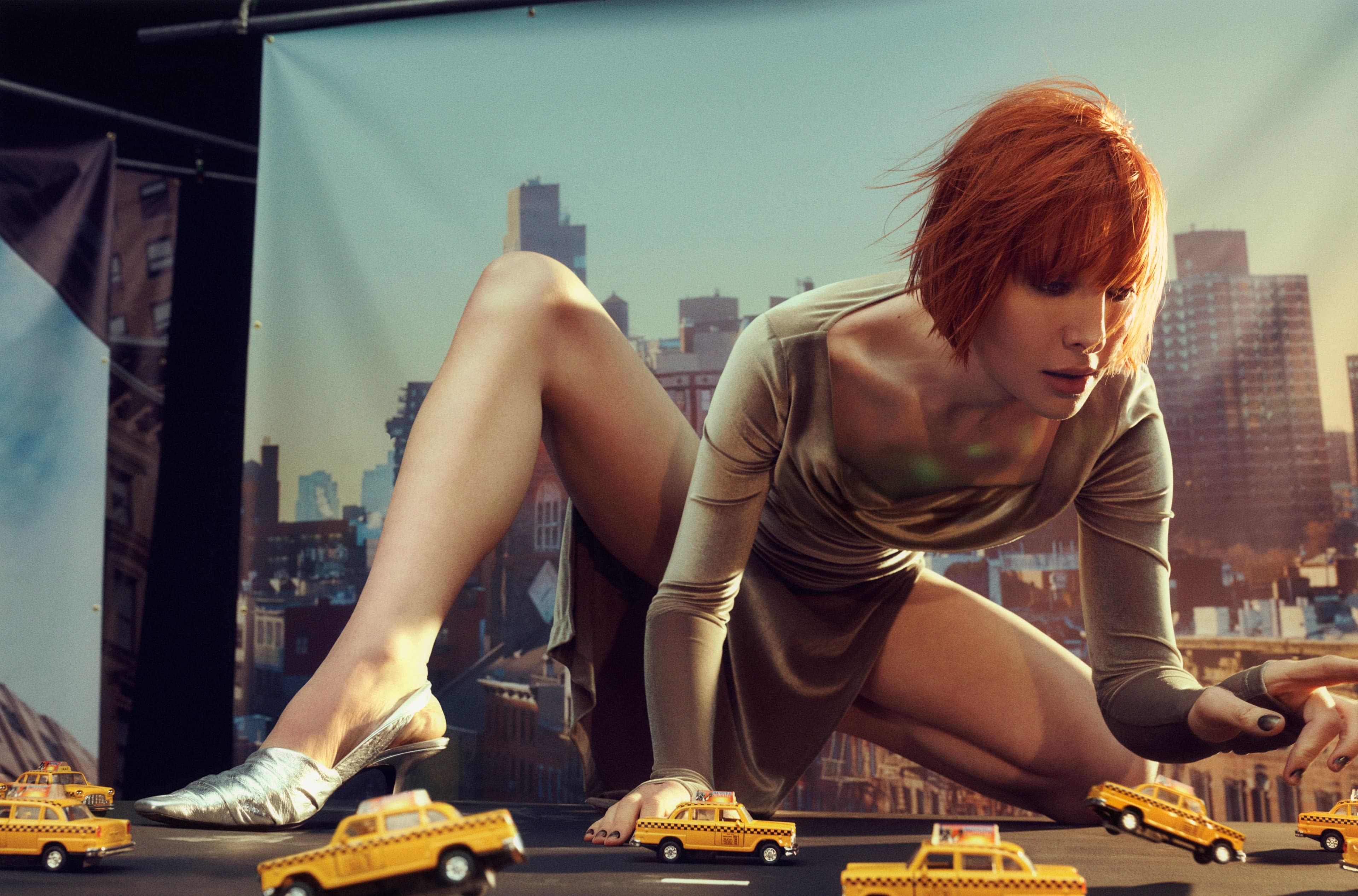
Dress by Helmut Lang. Shoes by Maryam Nassir Zadeh.
Hari Nef Puts Personal Connection First
If you feel like you’ve been hearing Hari Nef’s name a lot recently, yes, you have. As teasing for Greta Gerwig’s forthcoming and highly-anticipated summer release Barbie began this spring, Nef’s name appeared in glittering pink letters alongside a long list of household stars like Margot Robbie, Ryan Gosling, and Simu Liu.
In the campaign images, Nef’s hair is longer than ever, bejeweled and red; she’s wearing a sparkling dress finished with a giant bow; her smile is worthy of a cheer captain and the gold star stamp on her poster exclaims, “This Barbie is a doctor.“ There’s a gleam in her eye, like she knows something we don’t.
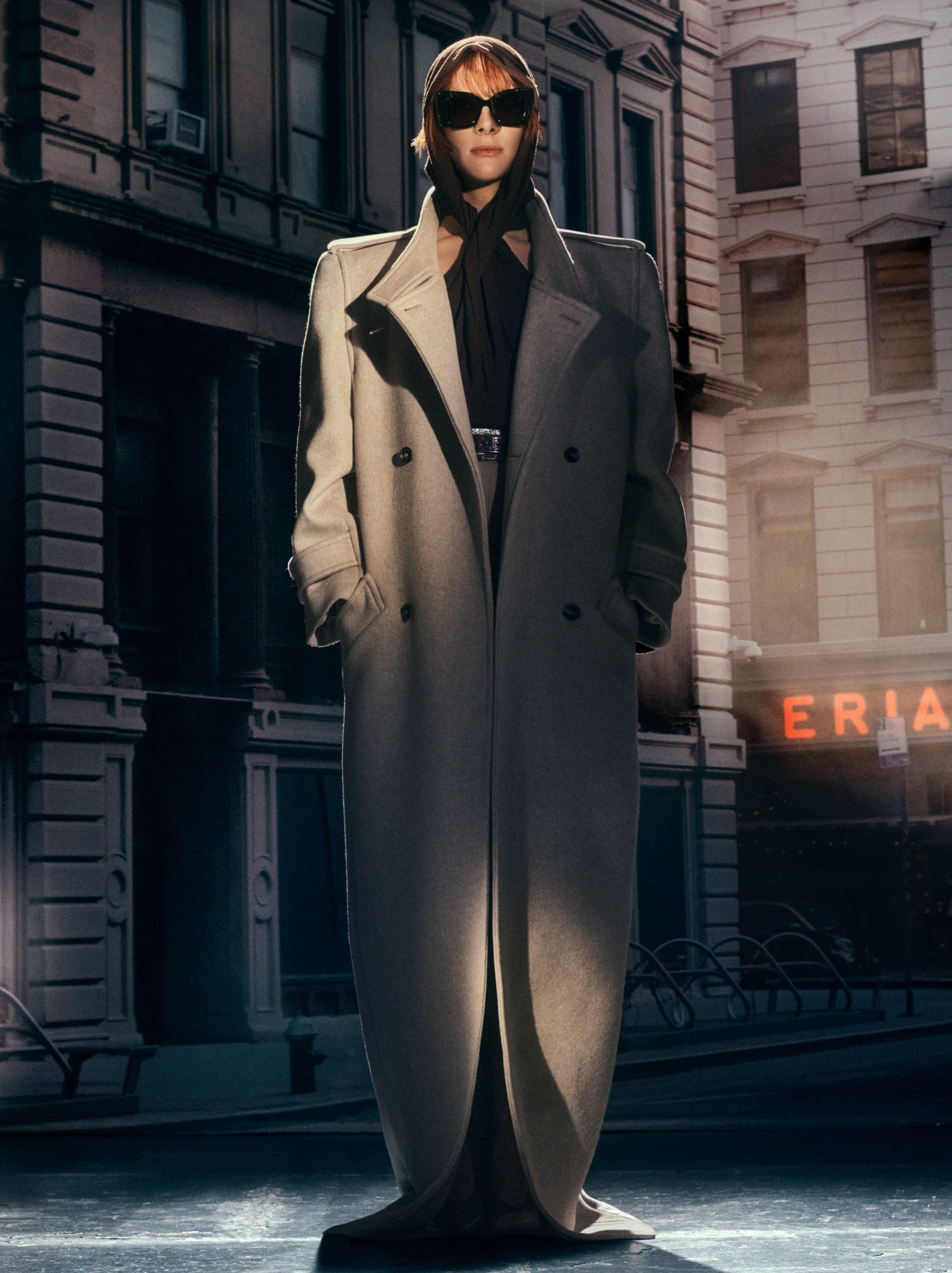
All clothing and accessories by Saint Laurent
Just months earlier at the end of 2022, Nef wrapped up a very different role in an Off Broadway stage production of Denis Johnson’s last play before his death, Des Moines. She starred as Jimmy, a trans woman who lives with her grandparents and whose botched gender-affirming surgery has left her wheelchair-bound. Nef calls the play, which ran for a month over the holidays, a parable of apart-ness. “No one in Des Moines comes from the same place, internally, or is really even speaking to one another in an obvious way,“ she says. It’s an uncanny and ridiculous script, following along as a group of five spend a night drinking and talking, and failing to understand one another. “There was a psychedelia to Johnson’s text which was so disorienting at first,“ says Nef, “then totally exhilarating as we learned to surrender to it.“
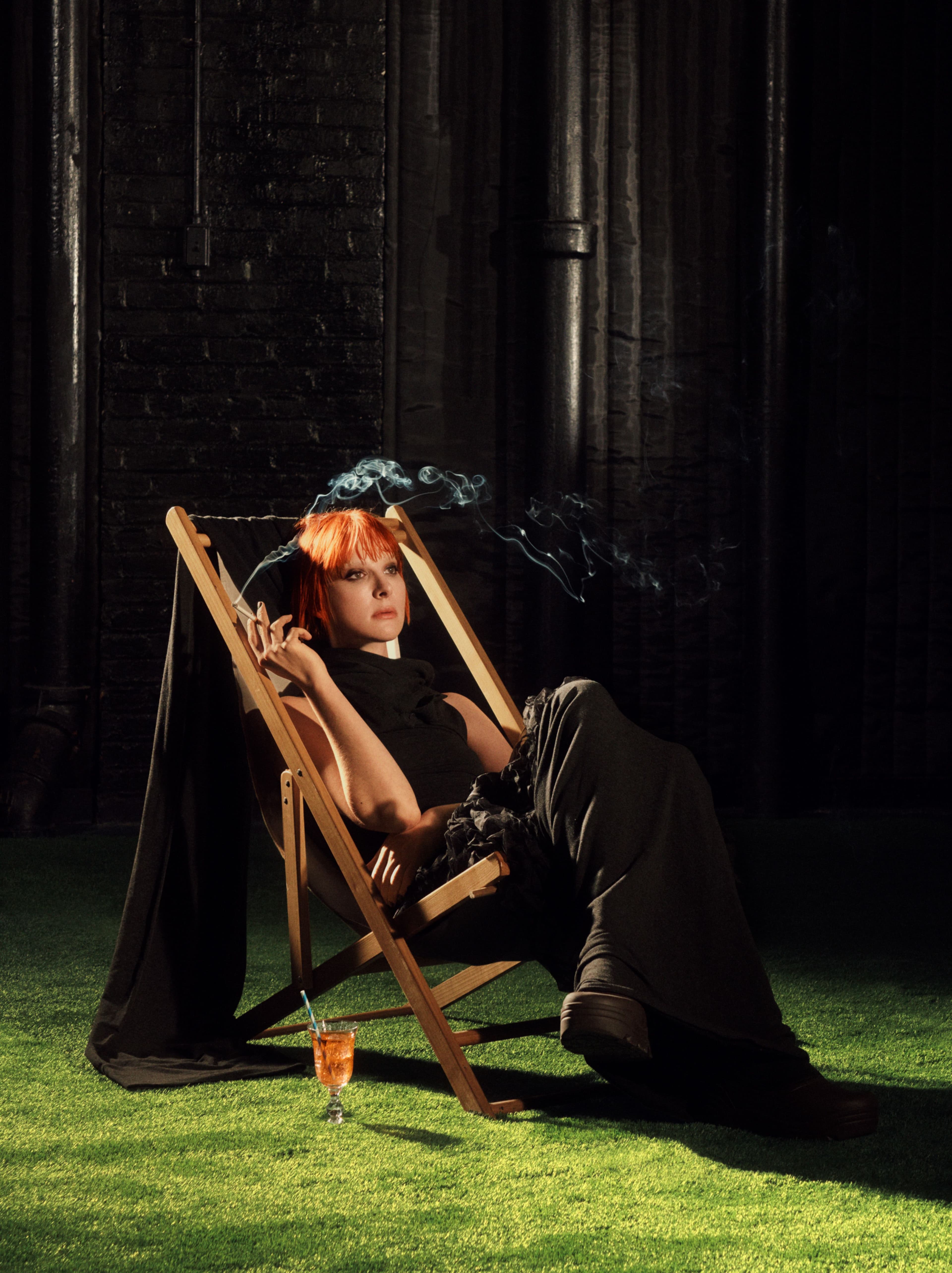
Dress and shoes by Loewe. Skirt by Undercover.
In the first half of this year, Nef has stayed busy, appearing again Off Broadway, her once-dark hair chopped into a sleek red bob, with a cast of nine others including Parker Posey in Thomas Bradshaw’s adaptation of Chekhov’s The Seagull. In stark contrast to the film about Mattel’s iconic toy, nearly everything about The Seagull/Woodstock, NY read as darkly comic and understated. Nef’s Sasha—an updated take on Chekhov’s original Masha—was a depressive character deeply committed to an unrequited love, gloomily chain smoking and dressed solely in black for the entirety of the play.
Now, Nef is firmly in the spotlight—in some ways, she always has been. The actress, model, and writer has been haunting the New York scene for more than a decade, from her days studying theater at Columbia, during which she’d do underground gigs at bars and clubs in the city (“somewhere between drag and performance art,“ she says), to signing worldwide with IMG, followed by fashion and beauty partnerships, magazine covers, and now more TV shows, feature films, and theater. For years, she wrote a column for Adult Magazine, about which, when I prudishly described it as a ’nightlife’ column, she aptly corrected me: “I wrote a sex column, actually.“ A funny, unapologetic sex column, telling stories of sex and love and exploration in the city of New York in the years prior to Covid-19. “New York is still sexy,“ she says. As summer approaches, so does a return to the excitement of possibility, accompanied by something new. “I’ve noticed a tenderness spring up in New York over the past few years,“ she explains, “a desire to come together with unconditional positive regard. Young New Yorkers are ambitious and cutthroat, but I’ve seen a shift: Rather than compete with one another, people seem more inclined to care and love on one another as we fight to make rent.“
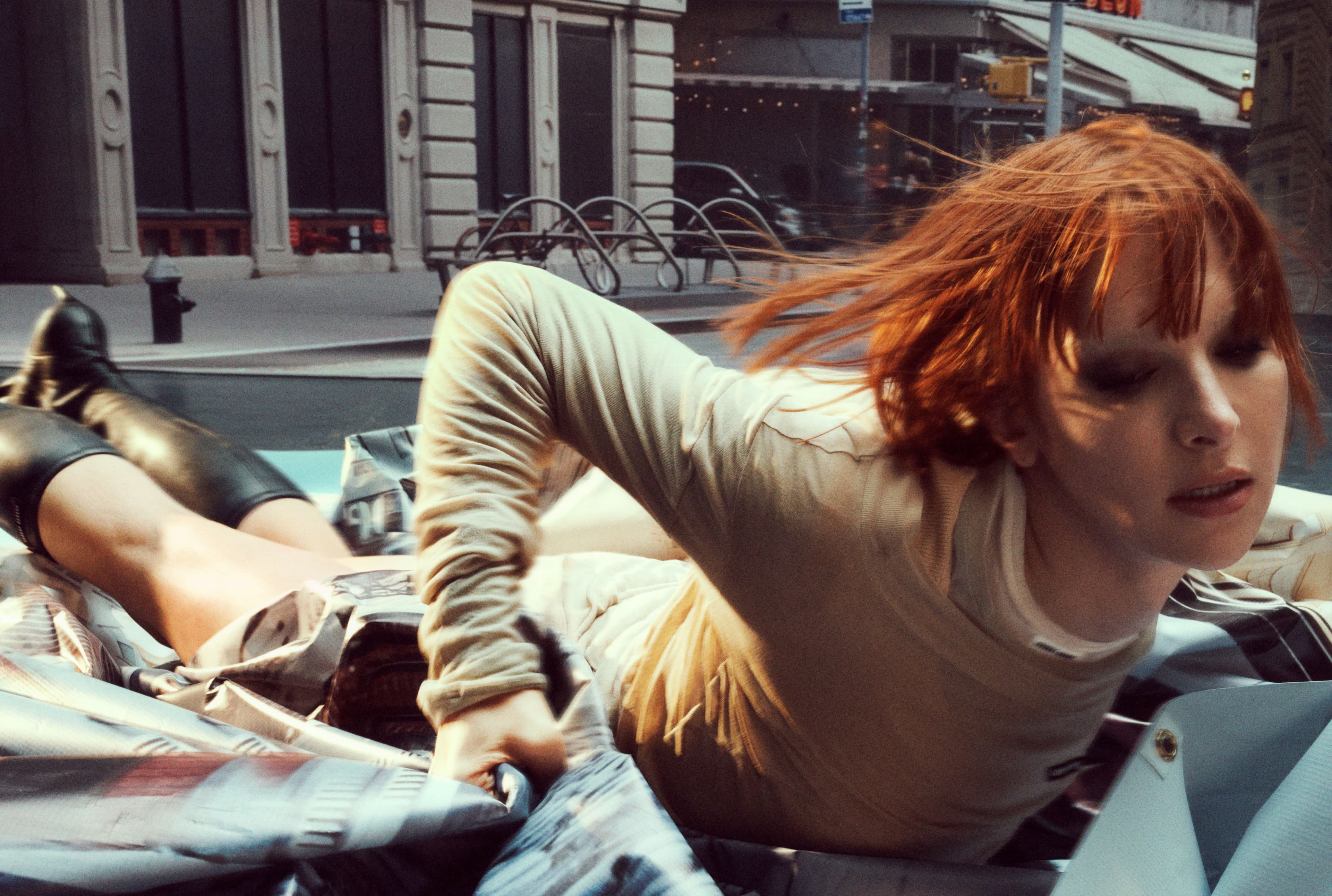
All clothing and boots by Miu Miu
Read Nef’s work, watch past interviews, and you’ll find she’s consistently outspoken and candid, often politically. But over the years, she has, of course, also grown up, and in some ways, reprioritized. Just over two years ago, in May 2021, she appeared by invite on Girlboss Radio with its then-host Puno to discuss the term #girlboss and its particular brand of feminism. She was candid then (“spicy,“ she calls it) in pointing out the inconsistencies and contradictions of liberal feminists—even her own. In the episode, she explains her distaste of the once-popular Girlboss movement in undeniably rational terms—as a kind of careerism—and turns it on its head: “I have put work first my entire twenties, and now I feel kind of spiritually bankrupt, because when I don’t get anything out of the work, I have nothing to fall back on. I’m twenty-eight years old, staring down the barrel of what my life is going to look like if I continue to put work first.“ She’s thirty now, and she’s squared herself with the question. “Without upkeep on mental and physical health—and that upkeep is a full-time job—I can’t deliver,“ she explains. “Loving and being loved, going to therapy, going to Pilates, to the chiropractor...these are the basics.“ These days, she says, “Work comes second, always.“
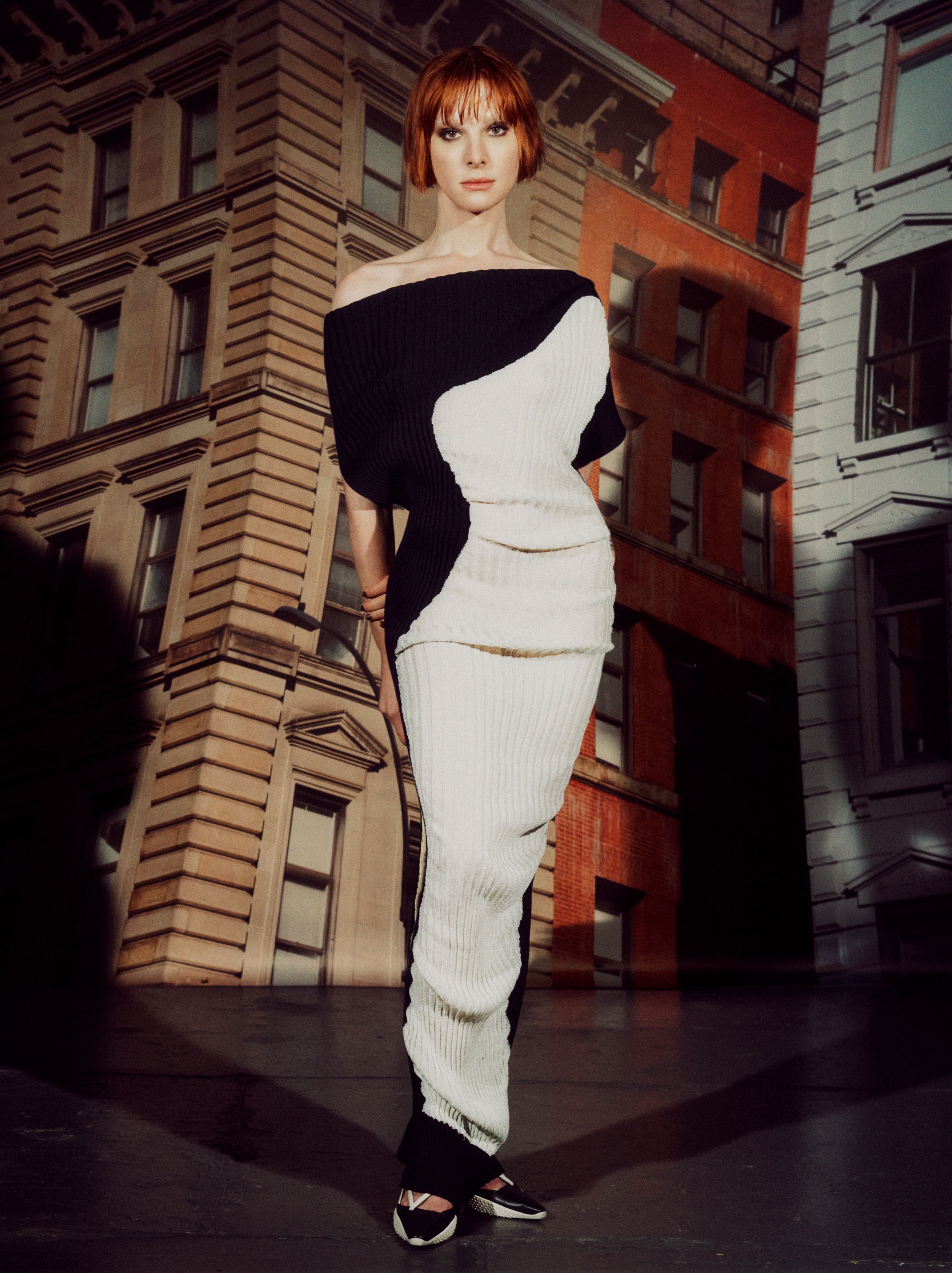
Dress by Issey Miyake. Shoes by Marine Serre.
Maybe that’s also why she’s returned to the stage. Acting, like writing, was something she did from a young age, first starring in The Wizard of Oz at the age of seven, and taking to the stage on and off over the years, whenever she felt like it. Since re-evaluating the ways she spends her time, over the past few years, she’s found a mental clarity that allows her to work from the heart. Without rejecting her past activism, she’s uncovered what matters most to her, and is taking on new projects with a more discerning eye. “Politics, I think, lie far from the heart,“ she tells me, when asked whether she sees herself as a political artist. In her view, “Politics are boring, but so salient in the current discourse,“ resulting in works of art that feel templatized, sterile, disingenuous. Instead, she says she’s “drawn to projects whose politics don’t square easily with current appetites for the squeaky clean, morally pure, unproblematic. I’m drawn to ambivalence and abjection, to mess and irreverence. I’m drawn to laughing at oneself so one can laugh at everyone else,“ she says. She’d rather not tell others how to think; they can deduce for themselves—and stage acting enables an intimacy between actor and audience that makes the work feel personal. Disconnected as it is from phone cameras and online discourse, theater performances give an audience time to contemplate first.
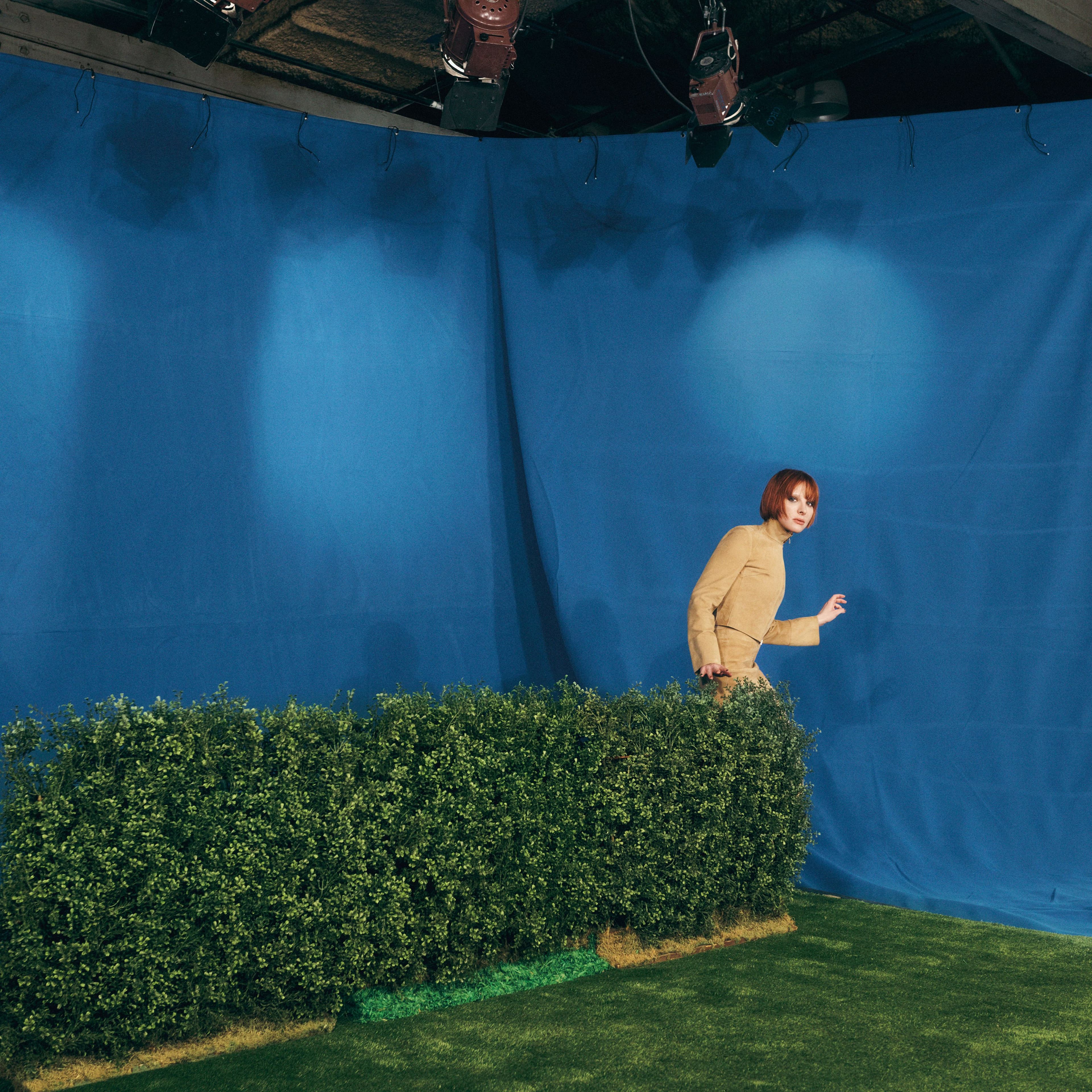
All clothing by Ferragamo
The Seagull/Woodstock, NY is a good example; though Nef describes it as “the least experimental play I’ve ever done—a little realism, why not!“ This seeming conventionality might be part of its strength. It’s true to the original, in a way that feels both familiar and unsettling. It addresses issues of race, sexuality, love, selfishness, mental illness, but offers few answers, remaining elusive and nuanced, leaving plenty open for interpretation. Nef says she was drawn to Sasha, a woman with resources and intelligence, yet who’s so committed to the pain of loving someone who doesn’t love her back, “because I wanted to understand and protect the heart of someone who chooses stasis and desolation and unrequited love,“ she explains. “I’m drawn to unhappy characters, to characters who are stuck. I try to honor their belief at all costs. Belief is a beautiful thing.“
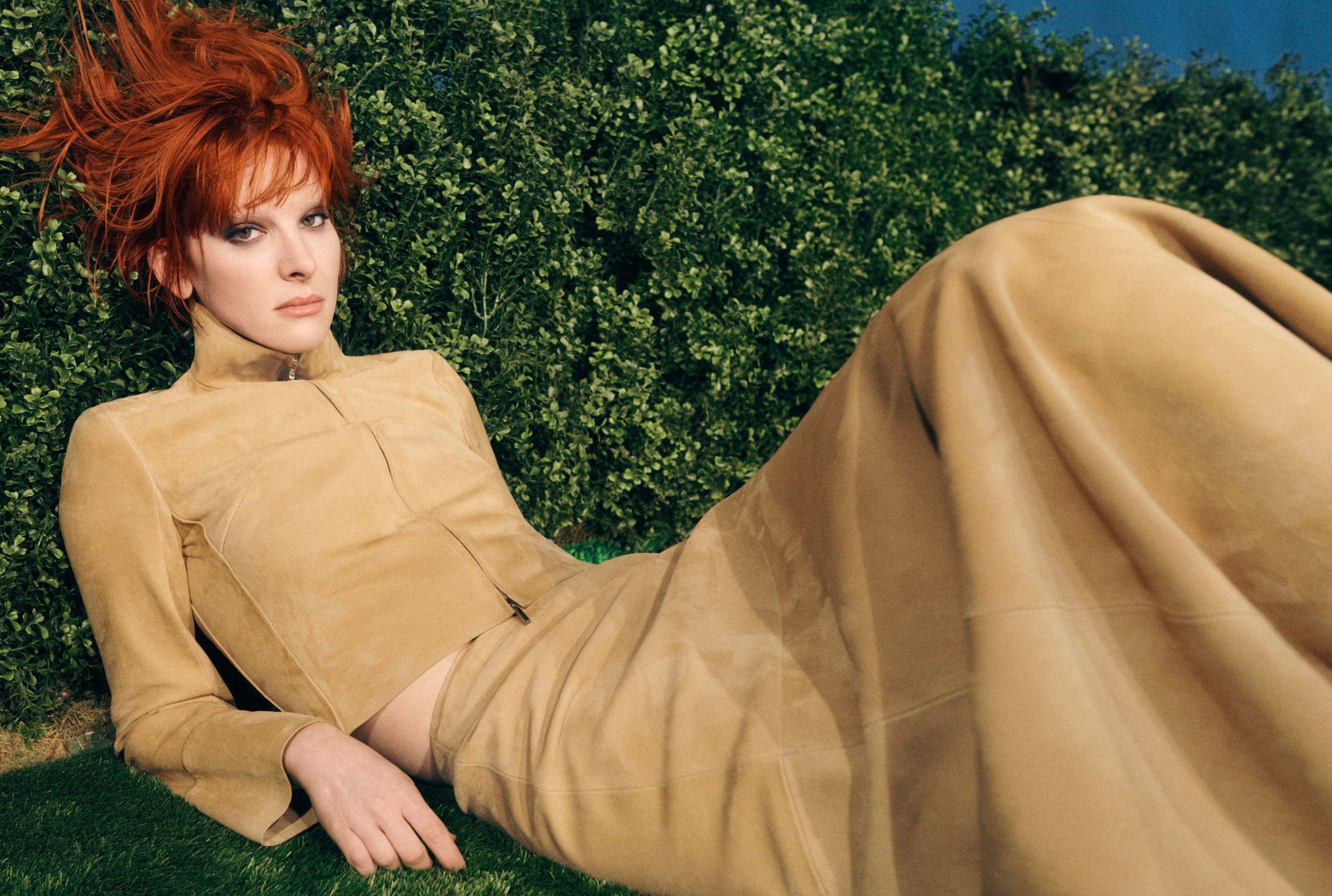
All clothing by Ferragamo
Nef’s penchant for complicated Off Broadway work goes back to 2019, when she made her New York stage debut in Jeremy O. Harris’s play Daddy alongside Ronald Peet and Alan Cumming. “I’m not an extremely technical actor; I prepare without premeditating, and I don’t take the work home with me,“ she explains. The result is an ease on stage that feels genuine, lulling her audience into a sense of complacency and belief, leaving them left unsure of what’s ’real’ or acted, improvised or scripted. “It’s vulnerable to let the scene play itself anew night after night, but that’s when it really sings,“ she adds. “The stakes of that are exhilarating, and doing it night after night teaches me so much about what my brain and heart and body can do if I let them lead me.“
According to Nef, Barbie, too, lives up to the fantasy of itself: a film with the potential to become almost as iconic as the doll. “It’s a childhood daydream rendered in flesh, or maybe plastic—I was given the privilege to put my stamp on it,“ she says. “I made a small offering to a big film and I hope it plays.“ She describes the script as “silly-smart,“ and says it might surprise you. “This is not your mother’s Barbie, or your grandmother’s Barbie, but it’s also not some algorithmically-generated squeaky clean PC cash grab blockbuster,“ she says. “It will make everyone scream, I think. The audacity! God, I can’t wait.“ And of course, this is Barbie. The Barbie. “The looks,“ she adds, “you’re not ready for the looks.“
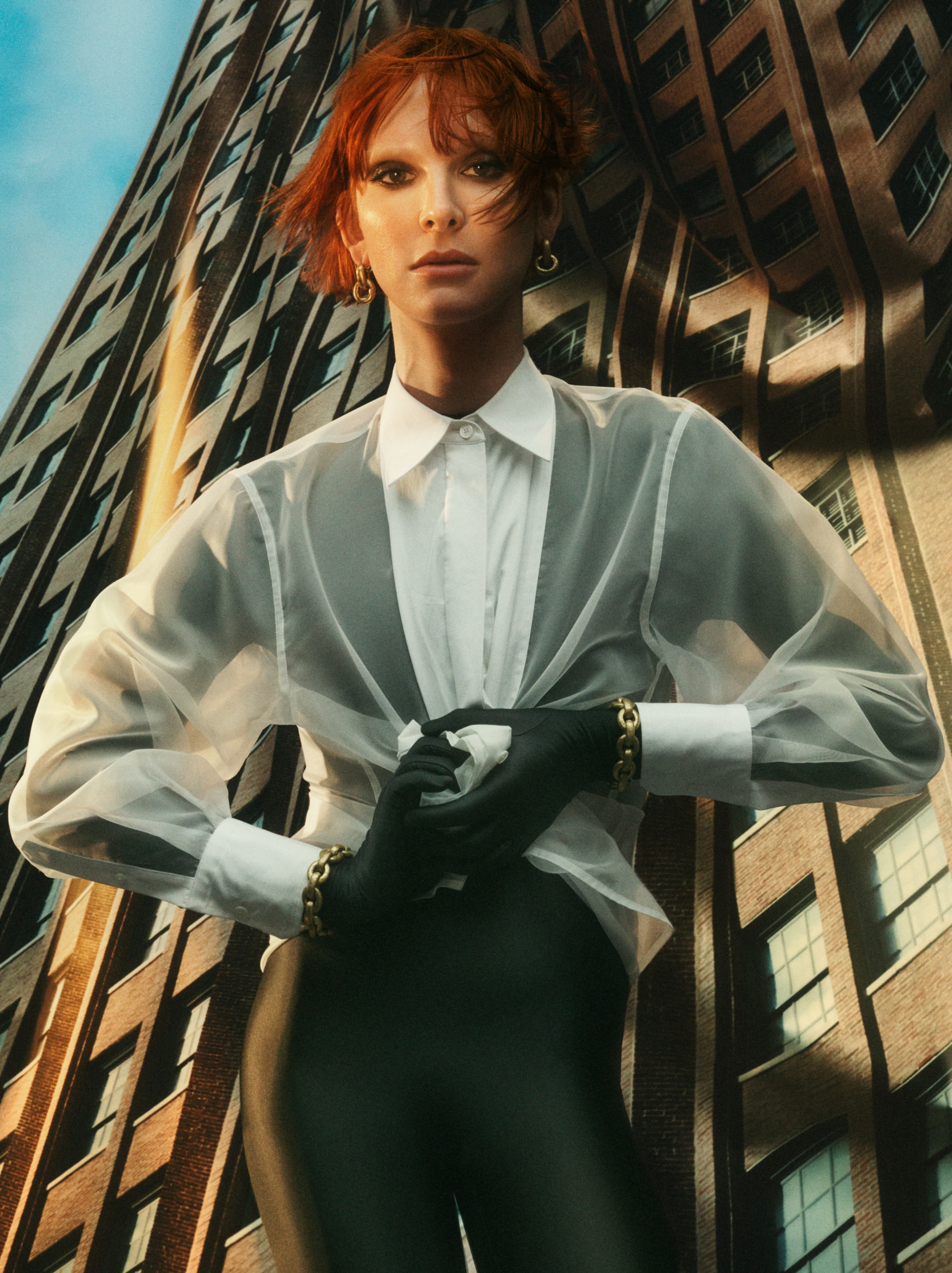
Shirt by Helmut Lang. Bodysuit by Marine Serre. All jewelry by Undercover.
At this point, it’s clear Hari Nef is a name we’ll all keep hearing. In addition to Barbie, she will also be seen in Sam Levinson and The Weeknd’s series The Idol, which premiered at the Cannes Film Festival before debuting on HBO in June, and she stars in Stewart Thorndike’s Bad Things, which premiered at last month’s Tribeca Film Festival. And as she has from the very beginning, Nef says she will continue to write. “My teachers encouraged me; my mom really encouraged me,“ she recalls. She says she was reading Robert Frost and Edna St. Vincent Millay by twelve and writing poetry of her own—plus playing video games for hours on end, perusing the flash-animated comedy sites of the early internet, drawing cartoons, and pranking her friends. “I was a menace!“ she laughs. But then “I showed more natural promise as a writer from the beginning,“ she reflects. “I think that had a lot to do with the work I had cut out for me in terms of finding myself, my body...but once all that came together, the acting advanced,“ she explains. “I think both disciplines service an impulse to be felt, a yearning for closeness. Acting and creative writing are a kind of intimate discipline—disciplines of intimacy,“ she says. “I’ll always go back and forth I think.“
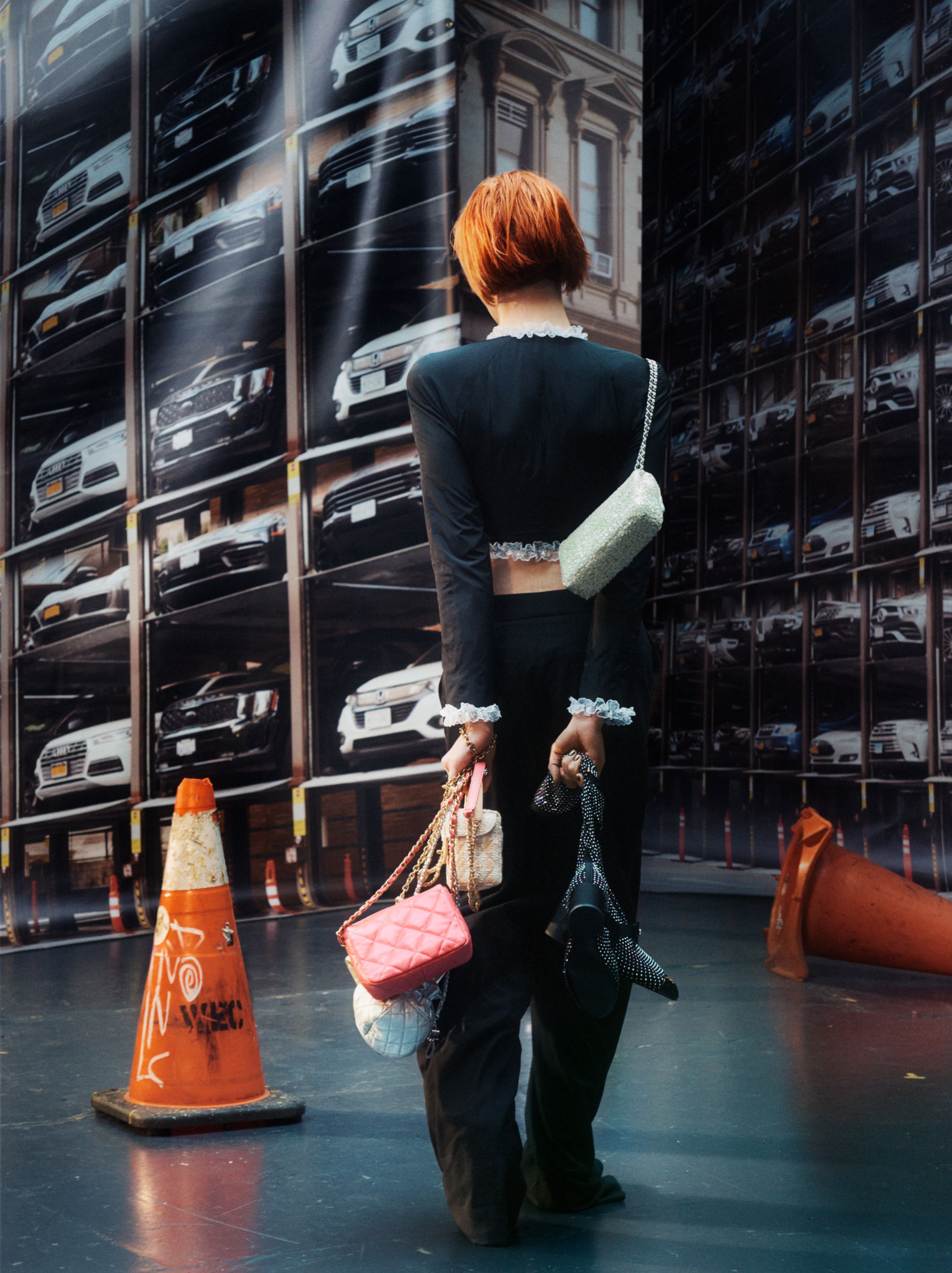
Top by Fidan Novruzova. Pants by Gauchere. Bags and shoes by Chanel.
In the end, she says it’s not just about the work she puts out. Nef yearns for connection and closeness with those she loves, and doesn’t take herself too seriously—from which there comes a kind of freedom. “Performing isn’t brain surgery,“ she says. With her two latest plays now wrapped, she says she missed New York’s restaurants and raves. But these days, she’s prioritizing connection over all. “When I’m not working, I’m at the movies, or I’m in someone’s apartment gossiping on a couch, or I’m dancing to very loud music somewhere in deep Brooklyn or Queens,“ she says. “Or I’m far from New York! It’s been about the people for me lately, more than the places.“
Barbie is out in theaters July 21. Read this story and many more in print by ordering our sixth issue here. Nef has selected Gays and Lesbians Living in a Transgender Society, which fights systemic discrimination against the transgender and sex worker communities, as the recipient of proceeds from direct sales of her cover of CERO06.
As a nonprofit arts and culture publication dedicated to educating, inspiring, and uplifting creatives, Cero Magazine depends on your donations to create stories like these. Please support our work here.
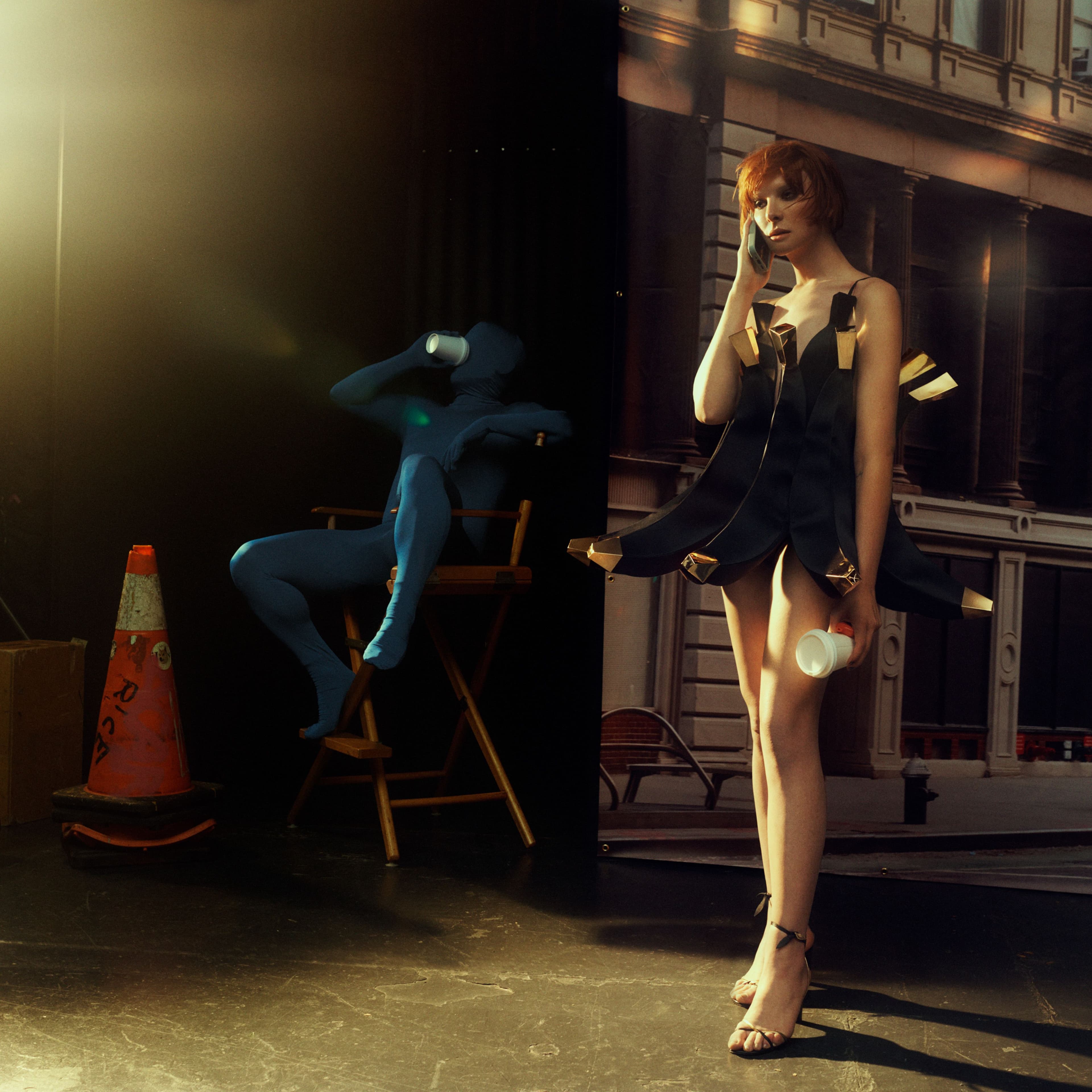
Dress by Area. Shoes by Maryam Nassir Zadeh.
As a nonprofit arts and culture publication dedicated to educating, inspiring, and uplifting creatives, Cero Magazine depends on your donations to create stories like these. Please support our work here.






